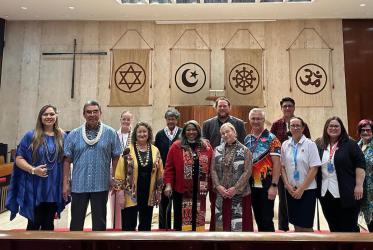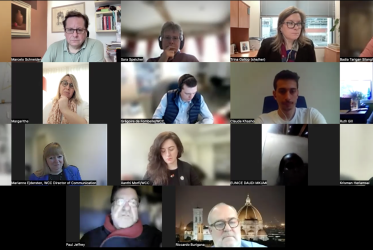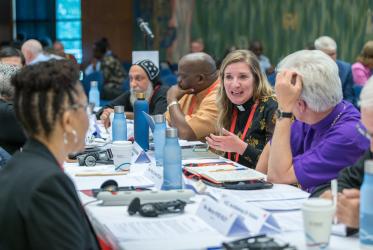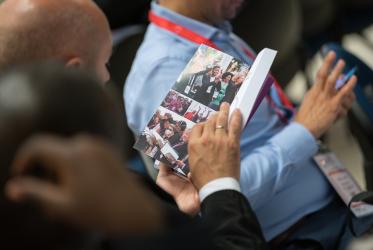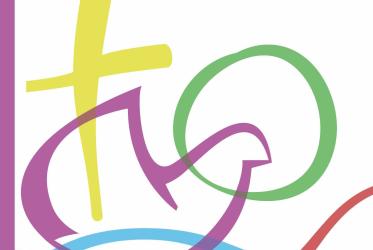The majority of Indigenous Peoples are the most marginalized communities in many parts of the world, exposed to poverty, disease, malnutrition, dispossession, exploitation, trafficking and forced migration and are denied possibilities of migration or asylum. Ever since their first contact with colonizers, Indigenous peoples have experienced a series of harms. They have been moved off their traditional lands, killed, exploited, dehumanised. In many cases their dispossession began with the ‘Doctrine of Discovery’ that permitted European colonizers to claim ownership of lands not inhabited by Christians.
Christ’s love calls us to reconciliation and unity. Reconciliation involves courage to dismantle oppressive structures, policies, ideologies and theologies that restrict access to the abundant life that Jesus promised for all. (John 10:10). The dominant discourse on reconciliation and unity has largely been responsible for the domination and suppression of Indigenous communities and other marginalized communities. Christian unity, in an Indigenous context, has often meant little more than conformity to the colonial way of life, and the dissolution of Indigenous, land-centered identity.
In line with the United Nations Declaration on the Rights of Indigenous People, Indigenous Christians claim their own power, agency, and authority to self-determination in spiritual matters. Indigenous theologians, Indigenous clergy, and the people of Indigenous churches have the capacity to formulate Christian theologies that have relevance, authenticity, and integrity. For Indigenous Christians, there is a fluidity and a porosity of the Spirit of Indigenous and Christian worldviews: one complements the other. Accusations of syncretism are not only unhelpful, but also abusive.
Healing from historical trauma is intergenerational. The mental and physical well-being of the children, grandchildren, and generations to come are at stake. This healing is directly tied to the healing and well-being of the lands, waters, and the air in the places they inhabit, and indeed in the whole world.
It also involves supporting Indigenous peoples in dealing with historical and ongoing trauma, and racism within the church, that still leads to suffering (e.g. suicide, substance abuse, and violence) and the loss of Indigenous lives.
Finally the church must commit to supporting Indigenous self-determination within ecclesial institutions in keeping with article 12.1 of the UN Declaration on the Rights of Indigenous Peoples. Throughout history, Indigenous Peoples have been categorically dehumanised and denied the right to self-determination by not being considered as “peoples”.
Love, as taught by Jesus of Nazareth, is radical. It heals and restores, and confronts and transforms. It calls us to love our enemies, restore justice, and make community with those pushed to the margins by the dominant systems and traditions. It indicts systems and cultures that discriminate and dehumanize. It empowers the disempowered and re-members the dis-membered. As such, Christ’s love is subversive and offensive to the systems and cultures that dominate, discriminate and dehumanize. Such love alone can make reconciliation lasting and unity real.
The 11th Assembly of the World Council of Churches (WCC) meeting in Karlsruhe, Germany, on 31 August - 8 September 2022, therefore:
- Stands in solidarity with all Indigenous Peoples across the world, and supports the rights of Indigenous Peoples to preserve their traditional lands and territories, to maintain and enrich their cultures and to ensure that their traditions are strengthened and passed on for generations to come;
- Commends the WCC for repudiating the Doctrine of Discovery and Terra Nullius and encourages its member churches, who have not already done so, also to repudiate these concepts.
- Calls upon the WCC to ensure that the Indigenous Peoples programme has its own fully financed desk with adequate resources, and that the WCC Climate Justice work with the Indigenous Peoples programme be strengthened.
- Urges the WCC and its member churches to initiate processes to address Indigenous peoples’ need for healing from historical and intergenerational trauma by the establishment of Truth and Reconciliation processes that are based on restoring justice and healing relationships wherever crimes against humanity and genocides have occurred.
- Calls upon the WCC to commit to advocate for the aspirations of Indigenous communities who struggle for self-determination (as per the UN Declaration on the Rights of Indigenous Peoples) and continue to be threatened by Green and Blue colonization.
- Expresses our solidarity with the Indigenous Peoples of West Papua, Maohi Nui, Kanaky and other places who continue to face grave violations of their human rights and obstacles to the realization of their equal human dignity.
- Encourages the WCC to continue its advocacy - in international fora such as the UN - with Indigenous Peoples and on their behalf in defence of their human rights, to protect the use of human rights language, to promote Indigenous Peoples´ right to self-determination and the right to participate in decision making processes within churches and in society in general, as per the United Nations Declaration on the Rights of Indigenous Peoples.
- Requests the WCC to promote education about Indigenous peoples’ theologies and worldviews, including as part of their efforts to address the climate crisis.
- Urges the WCC and member churches to take responsibility for their complicity in the destruction of Indigenous peoples and failures to support their journey to healing, wholeness, and fullness of life. The complicity of the Church in these genocides against Indigenous Peoples as well as the spiritual violence perpetrated by churches since first contacts prompts us to decolonize our faith traditions in order to rediscover the life-nurturing and rehumanizing potential of the gospel.
Annex / Background information:
The following information has informed the actions in this statement. The Public Issues Committee wishes to acknowledge with great appreciation of the Indigenous peoples pre-assembly and their message. It has greatly contributed to the creation of this statement.
When Christians brought the Bible, Indigenous People heard “God loves us. God loves our cultures and our languages and our spiritualities. God knows us and God loves us as spiritual beings in relationship with each other and with all of Creation. Our cultures are libraries of ancestral memory. Our languages which uphold our sacred relationship with our lands are storehouses of ecological well-being.” (Message from the 11th WCC Indigenous Peoples’ Pre-Assembly 28-30 August 2022, Karlsruhe, Germany)
However, across the globe, most Indigenous communities share a tragic common experience of marginalisation, poverty, disease, malnutrition, dispossession, exploitation, trafficking, forced migration, genocide, as well as eugenics in some instances.
The Sami people of Northern Europe have a history of being oppressed by the state, of which the churches of the region were part. Sami were subjected to eugenics and Sami remains have been collected and placed in museums and institutions to this day. The church was part of the colonization that led to the loss of Sami land down the line and also led to extensive exploitation. The ideology of green colonialism manifested in projects such as windmills or railways undermine Sami traditional and spiritual life.
In North America, the tragic experiences of Indigenous children in residential schools have shown how racism enabled even churches and people who thought they were doing good to seek to erase traditional identities and to remake Indigenous children in the image of their dispossessors.
Indigenous populations in Asia share a similar historical experience of killings, dispossession from their land, epidemic diseases, displacement and marginalization as a result of the intrusion of settlers from elsewhere. This was followed in many cases by violent encounters between Asian first peoples and settler societies. Today, most of these Indigenous communities live in highlands and other regions remote from the fertile agricultural plains that once formed the center of the continent’s great civilisations.
In Australia and Aotearoa-New Zealand, Indigenous Peoples of these lands were also displaced by European settlers, and they continue to struggle for recognition, land rights and self determination. In the neighboring Pacific, the historic marginalization and exploitation of Indigenous People is being compounded by the loss of their island homes to rising sea levels while the world continues to debate the issue of climate change. This is exacerbated by extractive and blue colonization industries which undermine the very fabric of Pasifika cultures, spiritualities and identities.
In Latin America, which is home to many Indigenous groups and cosmovisions, there are historical experiences of killings, dispossession from their land, epidemic diseases, displacement and marginalization as part of colonization. These communities continue to experience mistreatment with direct, political, structural violences. They face discrimination and human rights violations as well as limitations in access to land, to water and to justice. The region has witnessed recurrent killings of human rights and environmental activists and our people are facing indigenous genocide by big farmers and mining companies. This is a shared experience with communities of West Papua, Maohi Nui and Kanaky who continue to struggle for self-determination.
In Africa, Indigenous communities experience a lot of obstacles which include marginalisation, poverty, illiteracy, HIV/AIDS, but also non-recognition by governments and other ethnic groups. Those who engage in activism to fight for their recognition, land, language, and culture often experience intimidation, arrests, and even death.
Indigenous Peoples “are particularly concerned about the increasing nexus among neo-liberal economics, rightwing politics, and authoritarian regimes and their new mechanisms to silence and suppress dissent and aspirations for justice and rights of the marginalized communities in many parts of the world. As such our affirmations of love, reconciliation, and unity must involve critical engagement with these global and local dispensers of injustices, even if such actions threaten the positions of power and privilege of some of us.” (ibid)
Indigenous Peoples’ common understanding of the interdependent and interconnected reality and dynamics of life “compels us to assert that reconciliation that does not include the whole of God’s creation is incomplete and superficial. A holistic consciousness of life kindles and nurtures mutual respect and responsibility, enables one to be humble, just and compassionate. Seeking reconciliation is a spiritual and moral choice. It involves restoring justice, truth-telling, repentance and forgiveness. It is an ongoing journey that unveils God’s presence and purposes in all of God’s creation. It is not an easy journey, but one that calls for costly discipleship (Matt 19.21; Mark 8:34-35, Luke 9:23).” (Ibid)
“Reconciliation is not only about restoring broken human relationships but also humanity’s broken relationship with the creation. God’s love is not limited to the human world and life has no future without seeking reconciliation with the earth. We are the people of the earth and we call all to find our common earth identity.” (ibid)
However, hierarchies and power-based relationships, whether in the church or the wider society, obstruct such goals. “We remind the Church of unity as it is illustrated on the day of Pentecost, not by all of God’s children speaking the same language, but of each person being understood and honored in their own mother-tongue.” (Ibid)
There can be no reconciliation without understanding the truth of the spiritual violence Indigenous Peoples have experienced and without considerable work at healing. Indigenous Peoples are on their own healing journeys to recover their God-given identities. Everywhere in the world is difficult and in some parts of the world it is nearly impossible.
We gratefully acknowledge the places where reconciliation processes have begun and where churches have apologized to Indigenous Peoples for the harm the churches have done. The learnings of these processes should be shared with the member churches of the World Council of Churches, to encourage further reconciliation processes.
As underlined in the 2022 Indigenous Peoples’ Pre-Assembly Statement, the churches “must pursue reconciliation with Indigenous peoples around the world. It must confront and address the spiritual violence it has committed in the name of Christ's love, and in the pursuit of a unity that denies the God-given diverse identities of Indigenous peoples, including their spiritual identities. The church in its many global contexts needs to establish processes to hear the truth of the harm it has done, to repent of its sins, to atone, and to change its behavior. This extends to deep examination of its understanding of what it means to witness to Christ's love. Indigenous peoples have much to teach the church in this regard.”
WCC history with Indigenous Peoples issues:
Executive committee statement from 2012:
Minute on Indigenous peoples, 10th WCC Assembly:
https://www.oikoumene.org/resources/documents/minute-on-indigenous-peoples
Resolution on outcome of the Indigenous Peoples’ Conference on reconciliation processes and Indigenous peoples, 2016 Central committee:
